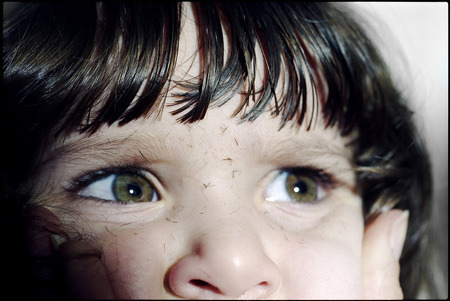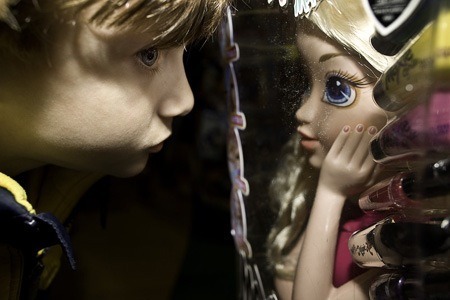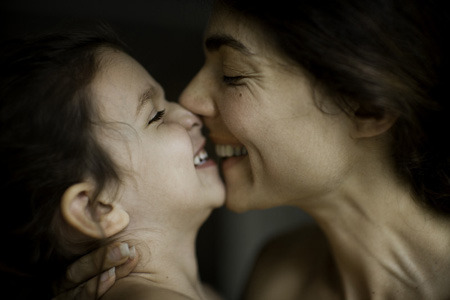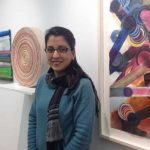Meet a NYFA Artist: Elinor Carucci
Photo Credit: Elinor Carucci/INSTITUTE
NYFA speaks to Elinor Carucci (NYFA Fellow in Photography, 2010) about her life as a photographer and her most recent monograph, Mother, which chronicles nine years of photographs of her family.
NYFA: What drew you to photography?
EC: It was a coincidence. I was fifteen and it happened one afternoon. I picked up my father’s camera, looked for something to photograph, and pointed it at my mom. She had just woken up from an afternoon nap, and there was something very beautiful and inspiring about that. After photographing her, I began photographing the rest of my family. What drew me to it was being able to see other people, and to discover more about myself and my relationship with others. As I started to photograph other people outside my family, I understood more about the world around me both while taking the pictures and later while looking at them. It was a way to connect with people in a stronger way than usual, and to focus on them during the process. It allowed me to see more depth in them, have more compassion, and pay attention to their subtleties and details. I see much more in life with a camera in my hands.
NYFA: Your work often depicts the most intimate aspects of your family and personal life. Why did you choose your family as the focus of your photography?
EC: It’s hard to tell why we choose to photograph one thing and not another. I am drawn to the everyday drama that exists within a family and the intimacy and complexity of those relationships. For me, a family is a microcosm for everything in the world. Everything is there, between parents and siblings and lovers and children. I chose my own family because I can draw a lot of material from them. It’s endless — the moments, dramas, and emotions that I can draw out of my life and from the lives of my children, my parents, and my husband — because I spend so much time with them. There are no limits when it comes to being inspired by my emotional life and family life.

Image Credit: Elinor Carucci/INSTITUTE
NYFA: Congratulations on your latest book, Mother. In what ways did the images or your process evolve over the 9 years you spent photographing your children?
EC: The images evolved in a few ways. The first was following my children as they grew older and formed into people. I discovered who they are and their personalities. I discovered myself as a parent to babies, then toddlers, then older children. Another way the work evolved was that for the first time, I took my photography outdoors. Most of my personal work was indoors, both in Israel and when I moved here to New York. This changed for many reasons. One was that kids act the same whether they are indoors and outdoors. They cry, they hug, they laugh, and they say whatever they want. So with my children, that intimacy existed outside of the home as well. The other thing was that as an immigrant, giving birth to two American children here in New York forced me to accept New York as my home. I think I wrote it in the forward to the book, but I gave birth to two roots, and suddenly, I could photograph outside, and it was home. Their school, the Duane Reade, the supermarket and the McDonald’s. Even though I moved here in 1995, I think I finally felt at home taking these photographs.
NYFA: What do your children think of your work – what kinds of questions do they ask, and how do you answer them?
EC: It’s different for both of my children. My son just accepted me and my work. My daughter was more challenging. At one point she asked me about the nature of my work. She asked, “Mom why don’t you take more pretty pictures- why are the pictures you take not pretty?” It led into discussions where I told her that I think the pictures are beautiful, and that pretty pictures are not always of smiling people seeming happy or celebrating. Who my daughter is, who her brother is, who our family, or my husband are, everything about our family is beautiful in a way. I embrace all of our time together, even if it’s difficult, moments of crying, arguments, sadness, or loneliness. I think it was a good message for the kids. I think they can see both in the photography and in me that nothing should not be discussed or not photographed. I don’t photograph all the time; actually, most of the time I’m not photographing, but whatever moment I choose to document is OK. We don’t need to hide our feelings or put on a façade. I think those answers helped them understand who I am and my beliefs and, maybe, embrace some of those beliefs for themselves.

Image Credit: Elinor Carucci/INSTITUTE
NYFA: What makes a photograph resonate with you, in your own work or in the work of others?
EC: It’s always an emotional connection to the work. I often see work that is very interesting and intellectual, but the work that really touches me is emotional. Not only in photography, but also in other art forms. I’m drawn especially to emotions that are universal, and I hope to have universality in my work as well. The photographers and the photographs I relate to usually touch me in a very deep way.
NYFA: What are you looking forward to most this year? What’s next for you?
EC: I want all people, not just parents (because we were all children at some point) to relate to Mother and identify with it. What’s next for me? You never know. Who knows? I’m working on some personal projects and hope to develop them. I gave my kids a break, and I think I’m going to give them a few years, but maybe I will go back to photographing them when they are teenagers.
NYFA: As a parent and a working artist, what advice would you give to other artists balancing an artistic and family life?
EC: Well, it’s hard. It’s hard not only for artists, but also for parents in general trying to balance working and raising children. Different people work in different ways and for me, I had to give up most of my social life. I think what helped me get through that was seeing how quickly my children are growing up and therefore it’s worth giving up other things, because they will not always be here depending on me and being so close to me. Those moments and those days watching them grow and develop will never come back. Sometimes raising kids and trying to work just feels like a pile of chores and things to do. You can forget to enjoy the process, and to just take a break and remember this time isn’t forever. I think it’s worth the effort to keep your career going and do the best you can and forgive yourself. Don’t be too hard on yourself. Especially women. Especially mothers. Do the best you can. Try to enjoy it. Try to see the beauty in it, but don’t try to be perfect.
NYFA: You received a NYFA Fellowship in Photography in 2010. How did that impact you and/or your work at that time?
EC: Receiving the fellowship in 2010 was really helpful. Anything that allows me to have some freedom to create so I don’t have to take on too many magazine jobs, or allows me to reduce the amount I’m teaching and work on my art is very helpful. So, receiving the financial support allowed me to devote more time to my project. And of course the recognition of people in my field was very important. It helped promote my work and my name and people were exposed to the work, and I was invited to give talks, so it was a wonderful thing.
—interviewed by Katherine Booth
For more information on Elinor Carucci, visit her website.
Mother can be purchased here.




